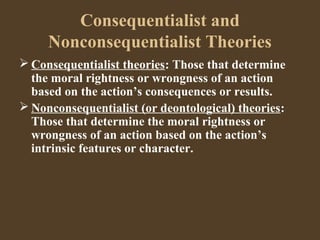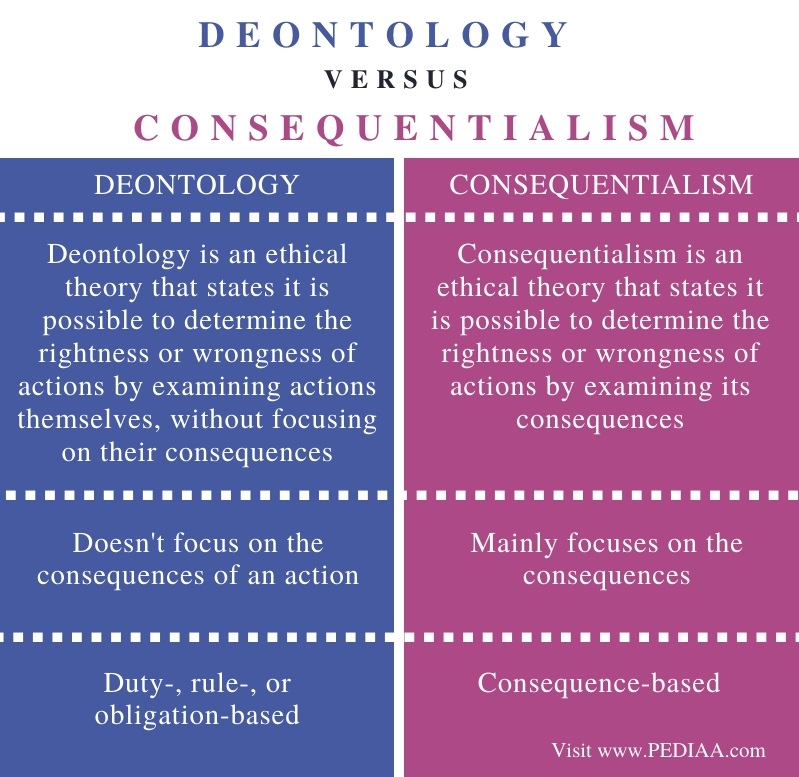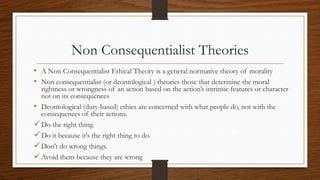Definition of Non Consequentialism in Ethics
Virtue ethics relies on virtues ie qualities that are considered morally good to make good ethical decisions. A code of ethics is a guide of principles designed to help professionals conduct business honestly and with integrity.

Ethics Act Non Consequentialist Travis Youtube
Like its previously-mentioned counterpart it focuses on conduct but there is a minor difference between deontology and consequentialism in this case.

. This historically important and still popular theory embodies the basic intuition that what is best or right is whatever makes the world best in the future because we cannot change the past so worrying about the past is no more useful than. In addition should they be regarded as being concrete entities ie things which have a determinate position in space and time. Moral absolutism is an ethical view that some potentially all actions are intrinsically right or wrong.
The Ethics of Belief was published in 1877 by Cambridge mathematician and philosopher William Kingdon Clifford in a journal called Contemporary ReviewAt the outset of the essay Clifford defends the stringent. A code of ethics document may outline the mission and values. Stealing for instance might be considered to be always immoral even if done for the well-being of others eg stealing food to feed a starving family and even if it does in the end promote such a goodMoral absolutism stands in contrast to other categories of normative.
What sorts of things are these candidates. Direct and Indirect Consequentialism. According to the definition of deontology in ethics it focuses more on obligation duty or ideal expectations.
According to non-consequentialism the rightness of an action is not solely determined by its consequences. Explaining The Difference between Act Utilitarianism and Rule Utilitarianism. Though most versions of non-consequentialism allow some ethical relevance of consequences.
Contrastivism about reasons for example holds that whether some consideration is a reason. A brief history 11 Origins of the debate. A contrastive theory of some concept holds that the concept in question only applies or fails to apply relative to a set of alternatives.
Consequentialism as its name suggests is simply the view that normative properties depend only on consequences. It includes questions about the nature of consciousness and the relationship between mind and matter between substance and attribute and between potentiality and actuality. Contrastivism has been applied to a wide range of philosophically important topics including several topics in ethics.
If moral statements cannot be true and if one cannot. The locus classicus of the ethics of belief debate is unsurprisingly the essay that christened it. Metaphysics is the branch of philosophy that studies the fundamental nature of reality the first principles of being identity and change space and time causality necessity and possibility.
Never kill an innocent person or never lie. The Ethics of Belief. Comparing Virtue Ethics vs.
In particular should the bearers of truth-values be regarded as being linguistic items and as a consequence items within specific languages or are they non-linguistic items or are they both. When offering a consequentialist account of rightness a common distinction in the philosophical literature is between two views called direct consequentialism and indirect consequentialism. Non-cognitivism is the meta-ethical view that ethical sentences do not express propositions ie statements and thus cannot be true or false they are not truth-aptA noncognitivist denies the cognitivist claim that moral judgments are capable of being objectively true because they describe some feature of the world.
The most famous version of non-consequentialism is deontology which holds that one has an absolute duty to obey certain rules. Rights Obligations Approaches. It focuses on identifying the moral conduct through which the right actions can be performed but based on what is laid.
Code of Ethics. In order to understand virtue ethics lets compare it. Consequentialist Non-Consequentialist Ethics Business Ethics.

Consequentialism Vs Non Consequentialism A Explain The Otosection

Chapter 2 The Normative Theories Of Ethnics

Consequentialist And Non Consequentialist Theory

What Is The Difference Between Deontology And Consequentialism Pediaa Com

Consequentialism Vs Non Consequentialism A Explain The Otosection

0 Response to "Definition of Non Consequentialism in Ethics"
Post a Comment